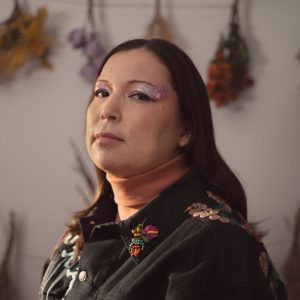 She was born with a guitar in her hands, in a family of musicians that sang Hank Williams as much as it did Georges Moustaki. “I inherited my family’s talent,” says Laura Niquay who, on April 30, will release a new album of folk and rock songs titled Waska Matiwisin, which means “circle of life” in her native Atikamekw language. “I was born to be a messenger,” she says. “That’s my talent and it’s important to value the talent you have.”
She was born with a guitar in her hands, in a family of musicians that sang Hank Williams as much as it did Georges Moustaki. “I inherited my family’s talent,” says Laura Niquay who, on April 30, will release a new album of folk and rock songs titled Waska Matiwisin, which means “circle of life” in her native Atikamekw language. “I was born to be a messenger,” she says. “That’s my talent and it’s important to value the talent you have.”
But the most important thing, insists the singer-songwriter, is to enunciate clearly while singing. “Especially since I write more and more with disused Atikamekw words that were used before,” she says. “It’s good for the young people in our community, especially those who live in urban areas,” as she is now, having moved to Trois-Rivières, more than three hours away from her home village of Wemotaci, northwest of La Tuque, Québec.
One example of such disused words, which can be heard on “Moteskano,” a folk song propped up by electric guitars, and rock as well as traditional drumming: “Nikinako ketcikinako,” sung in the chorus. It means “taking our shoes off and putting our shoes back on.” “It’s something we express differently today,” the musician explains. “What’s more, our Nation has three distinct communities that all speak Atikamekw slightly differently. I have nephews and nieces who live in the city, and who are slowly losing the use of our language, and this affects me a lot. It’s important for me to sing properly in our language.”
Niquay’s creative process is meticulous: she consults elders and works with techno-linguists – “three Atikamekw women who specialize in the field” – to make sure she has the right words in her songs, and to try to rehabilitate some that time has almost erased from memory. “I actually learn new words that I’ve never heard before, and that’s why it’s important to work with a techno-linguist,” she says. That’s not to mention the new words that enrich the vocabulary of the ancestral language. “Like the word ‘computer,’” she says. “That one hasn’t existed for very long!” And if you’re curious, it’s translated as “Kanokepitcikan.” The word for “iInternet” is even more complex: Pamikicikowipitcikan.
You won’t, however, hear those words on Waska Matiwisin, because Laura Niquay prefers signing about the universal rather than the modern. The importance of family, respect for nature, the sacred, and the spiritual realm are the central themes. “But above all,” she says, “it’s an album about resilience,” a word whose meaning was already too well understood by First Nations peoples before it became a mantra for the rest of Canadians during the pandemic.
“There’s also a song about mourning, ‘Otakocik/Hier,’ because we go through a lot of it in our communities, that also touches me a lot,” she says. “Another song, ‘Nicim/Mon petit frère,’ is about suicide. They are, however, songs that aim to prevent these things; that’s why I consider myself a messenger. I certainly don’t want to be a downer, but I just want to share my perspective on this ‘circle of life’ we all find ourselves in,” she says, with its dramas and happy moments. “We all live with our problems no matter where we are in the world. We’re all human, and this album was made for everyone.”
Niquay spent three years working on the creation and recording of the dozen or so songs on Waska Matisiwin, at Sophronik Studio in Verdun, under the direction of producer Simon Wall. They range from the soft, slide guitar-driven folk ballad “Aski/Terre” – which she sings with a voice that she herself deems “gravelly” – to the powerful rock of the formidable “Eki Petaman/Ce que j’ai entendu, to the aforementioned “Nicim/Mon petit frère,” an astonishing collaboration with Shauit, on a vaguely reggae groove, sung in Atikamekw and Innu.
One of the most touching songs of the album is “Nicto Kicko,” where Niquay’s soothing voice is carried by the sound of an upright piano, before beckoning an orchestra. The title means “Three Days,” which refers to the amount of time during which the artist didn’t hear about her father. “I turned that story into a slow song, because three days without a word is a long time, especially since it was snowing,” she says. “One of my uncles had been found dead at home and we were hoping it wouldn’t be my dad’s case.” Three days later, he was seen coming out of the grocery store. “Il ne nous avait jamais entendus / Parce que pendant trois jours Il voulait être seul / Avec ses écouteurs aux oreilles,” Laura sings softly. (“He never heard us / Because during those three days / All he wanted was to be alone / With his headphones on”).
“Most of the time when I’m writing, I’ll look for a melody, and I record myself to make sure I don’t forget,” says Niquay. “If I happen to hear a melody while I’m dreaming, the first thing I do when I wake up is to play it on my guitar. Then I write the lyrics. Sometimes I use other people’s stories, because a lot of people write to me. They share their stories, they confide in me. I look for the right words in their stories, and I use them to write a song.”